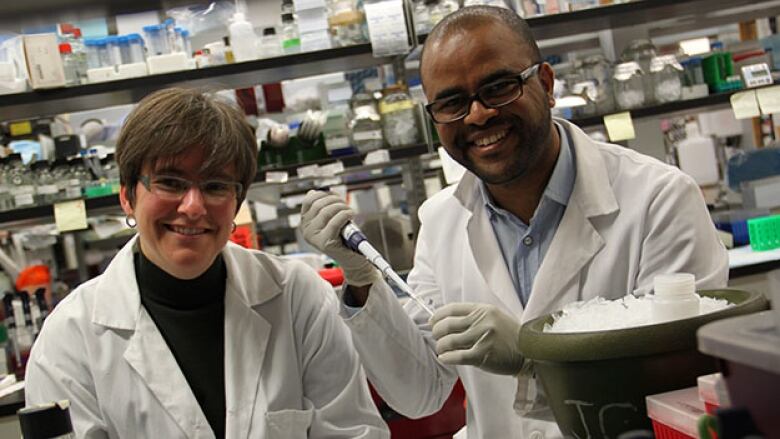Herpes helps fight cancer, McMaster study suggests
McMaster University research indicates herpes virus combined with chemo can help destroy tumours

Theres a promising new treatment option on the horizon to fight cancer: Herpes.
It sounds unusual, but its true. Combining a modified version of the herpes virus with traditional chemotherapy shows promise for killing cancer cells while easing the strain on a patient, two McMaster University studies suggest.
Its all about manipulating the system to get the response we want, said Karen Mossman, the chair of McMaster's Department of Biochemistry and Biomedical Sciences.
She and postdoctoral researcher Sam Workenhe found that the right combination of herpes and cancer drugs can be used to jumpstart the bodys own immune response to kill cancer. The findings were published in the scientific journals Molecular Therapy and Cancer Immunology Research this month.
In the trials, researchers used modified versions of the HSV-1 and HSV-2 viruses, which can cause mouth sores and genital herpes. But the viruseswere genetically modified so that they only attack cancerous cells, not healthy ones. That way, patients dont end up with herpes.
Thats why I love doing this. To me, this is so cool.- Karen Mossman,chair of McMaster'sdepartment of biochemistry and biomedicalsciences
In lab tests, the modified version of herpes is injected into a tumour, which brings about the bodys natural immune response to fight the virus. Our immune systems are very adept at killing viruses, Mossman says, so the herpes is very quickly wiped out.
In the meantime, the virus has killed enough tumour cells that the body starts to recognize the tumour, and fight that as well. In conjunction with chemotherapy, it could be extremely effective, Mossman says.
The beauty of that is even once the virus is long gone, the immune system is now also recognizing those tumour cells, and so the immune system can continue to clear those tumours, she said.
With the virus working to kill the tumour, much lower levels of chemotherapy can be used, leading to a less toxic environment for the patient, Mossman says. All around, there are fewer side-effects though the patient might feel like he or she has a viral infection for a couple of days.
If you have the right combination, they kind of feed off each other.
The process is now in the last steps of trials on mice, which Mossman calls very positive. She believes the treatment could be potentially two to three years away from U.S. Food and Drug Administration approval.
The research team is currently focusing on breast cancer and plans to expand its work to other types of cancer. Its likely that different kinds of viruses would be better suited to different kinds of cancer, Mossman said.
The McMaster professor has been working with viruses for over 20 years, and says its extremely exciting to see research like this start to come to fruition.
Thats why I love doing this, she said. To me, this is so cool.












_(720p).jpg)


 OFFICIAL HD MUSIC VIDEO.jpg)
.jpg)



























































































